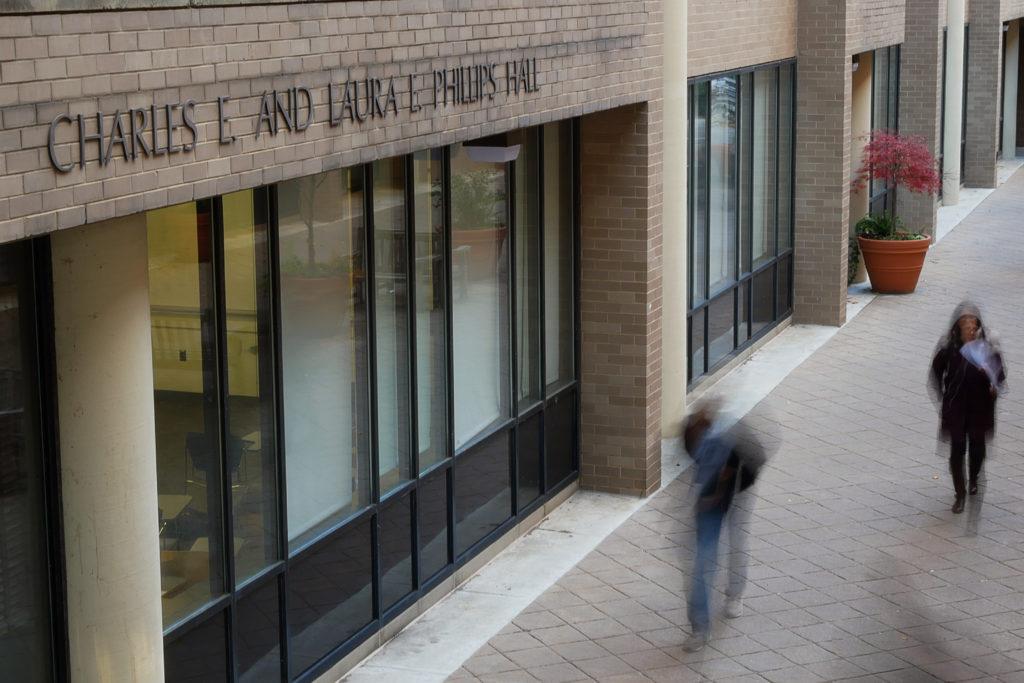Updated: Nov. 29, 2018 at 11:03 a.m.
The search for the next dean of GW’s largest school is currently underway.
Over the past month, the University assembled a committee to conduct a nationwide search for the next leader of the Columbian College of Arts and Sciences. Officials released a job description for the position earlier this month detailing what will be the new dean’s eight priorities – including strengthening research, improving the student experience and promoting diversity and inclusion.
CCAS has gone without a permanent leader since July, when Ben Vinson, the former dean, left the University to serve as the provost and executive vice president of Case Western Reserve University. Paul Wahlbeck, the former vice dean for programs and research and a professor of political science of CCAS, has served as the interim dean for about five months.
The executive search firm Isaacson, Miller will oversee the process, according to the job description. A representative for the firm declined to comment on the search, deferring to GW officials.
Provost Forrest Maltzman said the search committee has 16 members, including nine faculty members, the deputy provost and representatives for students, alumni and trustees.
He said new deans typically begin their tenure over the summer, but he said the search will conclude “when the candidate we want is identified and accepts.”
Maltzman declined to say if the University is recruiting potential candidates from outside institutions and, if so, how many.
“I think it will be important for the next CCAS dean to be a strategic thinker who can identify and implement plans to enhance the educational experience and post-degree opportunities for its students and further strengthen its research profile,” he said.
The new dean will “inherit CCAS in a position of strength in terms of finances, enrollment and overall infrastructure within GW,” according to the job description. The description also states that the new dean should be able to unify CCAS’ 42 departments and programs, fundraise to support new programs and promote interdisciplinary collaboration.
Lynne Bernstein, a professor of speech and hearing sciences and the chair of the search committee, declined to comment on the search. The other eight professors involved on the search committee did not return multiple requests for comment.
Harald Griesshammer, an associate professor of theoretical nuclear physics and particle physics, said the committee should prioritize finding a dean who is committed to the position and doesn’t see the job as a stepping stone to their next opportunity. He said the committee should look at the longevity of candidates’ previous jobs because switching institutions frequently shows that a candidate is more likely to leave GW and will focus on short-term goals instead of investing in GW’s long-term wellbeing.
“Many of them go on the dean’s path because they want to end up in prestigious positions, so that’s very very difficult to disentangle from the usual job interview speech,” he said.
Griesshammer added that a new dean should prioritize diversity, which can be promoted through offering more financial aid opportunities.
“The biggest challenge is a diverse student body and in general just a student body of equal and better quality,” he said. “Particularly looking forward 10 or 15 years, it’s going to become more and more challenging because it’s just so expensive. It’s not GW, everything’s so expensive.”
Katrin Schultheiss, the chair of the history department, said it is important to have a dean who is aware of trends in higher education but is also able to recognize fads, like the popularity of overseas campuses, which she says GW has been “wise” to steer clear of.
“There are ways in which GW fits into broader trends in the country, but there are ways in which GW has its own identity and needs to be aware of that and not try to be a University that it won’t be and shouldn’t be,” she said.
Schultheiss said there are strong candidates for the position within the University, and she hopes the search committee will avoid hiring someone from outside the University who has “gigantic” plans that might not be realistic.
“I’m not saying that we should think small, but I think that we should be a little skeptical of the shiny new thing that might come our way,” she said.
This post was updated to reflect the following correction:
The Hatchet incorrectly reported that CCAS has been without a permanent dean since March. The school has not had a permanent leader since July. We regret this error.





